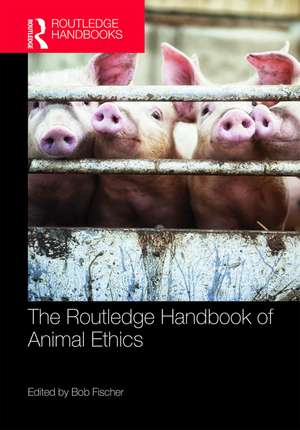The Routledge Handbook of Animal Ethics: Routledge Handbooks in Applied Ethics
Editat de Bob Fischeren Limba Engleză Hardback – 11 dec 2019
The Routledge Handbook of Animal Ethics is composed of 44 chapters, all appearing in print here for the first time, and organized into the following six sections:
I. Thinking About Animals
II. Animal Agriculture and Hunting
III. Animal Research and Genetic Engineering
IV. Companion Animals
V. Wild Animals: Conservation, Management, and Ethics
VI. Animal Activism
The chapters are brief, and they have been written in a way that is accessible to serious undergraduate students, regardless of their field of study. The volume covers everything from animal cognition to the state of current fisheries, from genetic modification to intersection animal activism. It is a resource designed for anyone interested in the moral issues that emerge from human interactions with animals.
| Toate formatele și edițiile | Preț | Express |
|---|---|---|
| Paperback (1) | 333.53 lei 3-5 săpt. | +48.29 lei 10-14 zile |
| Taylor & Francis – 21 ian 2023 | 333.53 lei 3-5 săpt. | +48.29 lei 10-14 zile |
| Hardback (1) | 1572.21 lei 6-8 săpt. | |
| Taylor & Francis – 11 dec 2019 | 1572.21 lei 6-8 săpt. |
Preț: 1572.21 lei
Preț vechi: 1917.32 lei
-18% Nou
Puncte Express: 2358
Preț estimativ în valută:
300.83€ • 314.94$ • 248.93£
300.83€ • 314.94$ • 248.93£
Carte tipărită la comandă
Livrare economică 05-19 aprilie
Preluare comenzi: 021 569.72.76
Specificații
ISBN-13: 9781138095069
ISBN-10: 1138095060
Pagini: 602
Ilustrații: 54
Dimensiuni: 178 x 254 x 38 mm
Greutate: 1.24 kg
Ediția:1
Editura: Taylor & Francis
Colecția Routledge
Seria Routledge Handbooks in Applied Ethics
Locul publicării:Oxford, United Kingdom
ISBN-10: 1138095060
Pagini: 602
Ilustrații: 54
Dimensiuni: 178 x 254 x 38 mm
Greutate: 1.24 kg
Ediția:1
Editura: Taylor & Francis
Colecția Routledge
Seria Routledge Handbooks in Applied Ethics
Locul publicării:Oxford, United Kingdom
Public țintă
Postgraduate and UndergraduateCuprins
Introduction 1. Psychological Mechanisms Involved in Human– Animal Interactions: How Do Humans Cognize About Animals 2. Understanding the Moral Implications of Morgan’s Canon 3. Animal Intelligence 4. The Emotional Lives of Animals 5. Animal Self-Awareness: Types, Distribution, and Ethical Significance 6. The Moral Animal 7. Quantifying Animal Well-Being and Overcoming the Challenge of Interspecies Comparisons 8. Cost-Effectiveness in Animal Health: An Ethical Analysis 9. The Origins of Factory Farming in the United States: An Overview 10. The Economics of Intensive Animal Agriculture 11. Animal Welfare—Is Intensification the Problem? 12. Intensive Animal Agriculture and the Environment 13. Intensive Animal Agriculture and Human Health 14. Seafood Ethics: Reconciling Human Well-being with Fish Welfare 15. Small-Scale Animal Agriculture 16. Subsistence Hunting 17. Institutionalized Ethical Assessments of Animal Experiments 18. Animal Models: Problems and Prospects 19. Applied Ethics in Animal Experimentation 20. Genetic Engineering of Nonhuman Animals 21. Building Ethical De-extinction Programs: Considerations of Animal Welfare in Genetic Rescue 22. Pets 23. The Ethics of Domestication 24. The Ethics of Keeping Pets 25. The Ethics of Companion Animal Euthanasia 26. Links Between Violence Against Humans and Nonhuman Animals: Examining the Role of Adverse Family Environments 27. Zoos and Aquariums Committing to Integrated Species Conservation 28. The Educational Value of Zoos: An Empirical Perspective 29. Moral Arguments Against Zoos 30. Defensible Zoos and Aquariums 31. Killing for Conservation: Ethical Considerations for Controlling Wild Animals 32. Ethical Dimensions of Invasive Animal Management 33. Property, Regulation, and Endangered Species Conservation 34. The Laissez-Faire View: Why We’re Not Normally Required to Assist Wild Animals 35. Welfare Biology 36. Wild Animals as Political Subjects 37. The History of Animal Activism: Intersectional Advocacy and the American Humane Movement 38. The Political and Cultural Sociology of Animal Advocacy 39. Beyond Compare: Intersectionality and Interspecieism for Co-liberation With Other Animals 40. Political Lobbying for Animals 41. Effective Animal Advocacy 42. Cultured Meat: A New Story for the Future of Food 43. Veganism, (Almost) Harm-Free Animal Flesh, and Nonmaleficence: Navigating Dietary Ethics in an Unjust World 44. Animal Sanctuaries
Notă biografică
Bob Fischer is Associate Professor of Philosophy at Texas State University. He is the author of The Ethics of Eating Animals (Routledge, 2019) and Animal Ethics: A Contemporary Introduction (Routledge, 2020).
Recenzii
"A wonderful collection of well-informed and diverse perspectives on some of the most interesting and important topics in contemporary animal ethics. Highly recommended."
Ben Bramble, University of Liverpool
Ben Bramble, University of Liverpool
Descriere
This interdisciplinary handbook covers everything from animal cognition to the state of current fisheries, from genetic modification to intersection animal activism. It is a rich resource on the moral issues of human interactions with animals.















